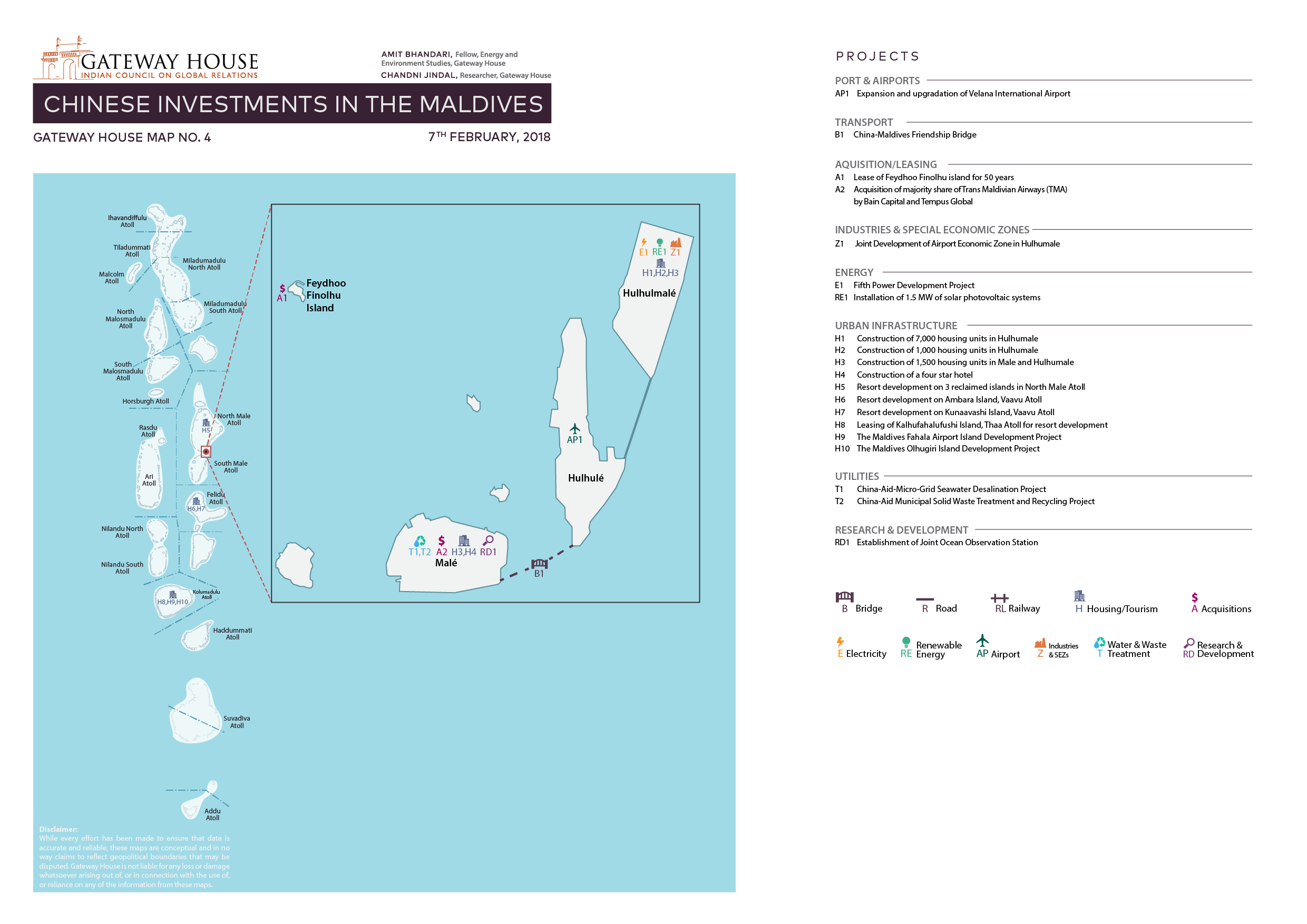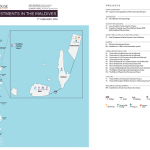Don’t Miss Neelam Deo and Amit Bhandari’s article: Maldives: the Quad’s first crisis

The political crisis in the Maldives shows that large-scale Chinese investments can undermine democratic institutions. For India, this is a warning that Chinese investments in South Asian nations can alter India’s geopolitics by manipulating latent, unresolved hostilities.
The Maldives has traditionally been in the Indian sphere of influence. But since 2013, when Abdulla Yameen was declared the winner of a disputed election, it has drifted away from India and into the Chinese orb.
One of the early signs was in 2015, when the parliament of the Maldives amended the constitution to allow foreigners to own land in the archipelago. Subsequently, a Chinese company took the island of Feydhoo Finholu on a long-term lease.
In late 2017, the parliament rushed through a free-trade agreement with China – a 1,000-page document that was passed after less than an hour’s discussion. In early 2018, President Yameen carried out a coup by ordering the arrest of the Chief Justice and opposition parliamentarians. He received political cover from China, which called on the international community to refrain from actions that may ‘further complicate the situation.’
The Impact of Chinese Investments
Chinese investments in the Maldives – focused on infrastructure, housing, power and hotels –played a role in creating this situation. The Chinese interest in the Maldives came out in the open in 2012, when an Indian company, GMR Infrastructure Limited, saw its contract to develop the Male International airport scrapped, and the job awarded to Beijing Urban Construction Group. Since then, Chinese investments and aid to the Maldives have surged, supporting multiple housing projects (Refer map: H1-3), a power plant (E1), an expensive bridge (B1), water and sewage treatment plants (T2), hotels (H4-8) and airlines (A2). Beijing now has leases on 17 of the 1,200 islands that constitute the Maldives, alleges ex-President Mohamed Nasheed.
Gateway House research shows that the three largest Chinese projects are together worth $1.5 billion – more than 40% of the Maldivian GDP. This will inevitably cause repayment problems, as visible in Sri Lanka, another country deep in debt to China.
Even the natural advantage of the Maldives – high-end tourism – which brings in a quarter of GDP, has become China-dependent. The largest number of tourists to the Maldives now comes from China via regular commercial flights. The international airport where they arrive is being developed by a Chinese company. The sea-plane operator that takes them to island resorts is owned by a Chinese firm, as are many of resorts.
Even if it wants to, the Maldives cannot now move completely beyond China’s reach.
Implications for India
For India, this has multiple implications:
- An undemocratic regime beholden to China can be manipulated to work against Indian interests. In future, the Maldives can provide China with military facilities and access, as Pakistan had done.
- The Maldives can be a passage to smuggle Chinese goods into India, just as it is done via Nepal. This can undermine Indian manufacturing and Prime Minister Modi’s Make in India programme.
- While China claims almost the entire South China Sea as its sovereign territory, it characterises the Indian Ocean as an international waterway. Chinese companies have scouted for minerals in the Indian Ocean in the past, and signed agreements with the International Seabed Authority to explore for minerals in the Pacific. Having a physical presence in countries, such as Sri Lanka and the Maldives, will make it easier for China to exploit these resources in the future.
India is prevented from a military response in the Maldives because there is no legal case for it in international law. Taking the matter to the United Nations will not help because China, with a veto in the UN Security Council, has made its stance clear on external intervention in the Maldives.
What Can Be Done?
India has made statements, asking all parties in the Maldives to abide by the Supreme Court judgment of February 2 in favour of the opposition, and expressed hope that the emergency is limited to 15 days. Both expectations were belied. India must follow talk with action in these ways:
- Vocally and materially help all democratic forces in the Maldives, including former President Nasheed;
- Mobilise the Commonwealth to issue a statement, condemning the coup. This strategy is necessary since Pakistan, a member of the South Asian Association for Regional Cooperation (SAARC), prevents this regional body from taking appropriate action;
- India and the U.S. must issue a joint statement condemning the subversion of democracy, and impose sanctions on the individuals and companies responsible. Since the Maldives is a tourism-dependent economy, Western sanctions can be effective in changing its behaviour;
- Activate the Quad – the U.S., India, Japan and Australia – to speak out together. This could be the first crisis to produce a united response from the four countries.
The Maldives has been simmering since 2012 when President Nasheed was overthrown. Because India did not act earlier, the only options left are the less dramatic, long-term ones. India must ready for a long slog.
Update (23 March 2018): This post has been updated to reflect the final caption published in the ‘Chinese Investments in India’s Neighbourhood’ report
This map is part of a larger book on Chinese Investments in India’s Neighbourhood. To see the project description and place an order for the book, please click here.
Amit Bhandari is Fellow, Energy and Environment Studies at Gateway House
Chandni Jindal is Researcher at Gateway House
Visualized and mapped by Debarpan Das
This map was exclusively developed by Gateway House: Indian Council on Global Relations. You can read more exclusive content here.
For interview requests with the author, or for permission to republish, please contact outreach@gatewayhouse.in.
© Copyright 2018 Gateway House: Indian Council on Global Relations. All rights reserved. Any unauthorized copying or reproduction is strictly prohibited.


